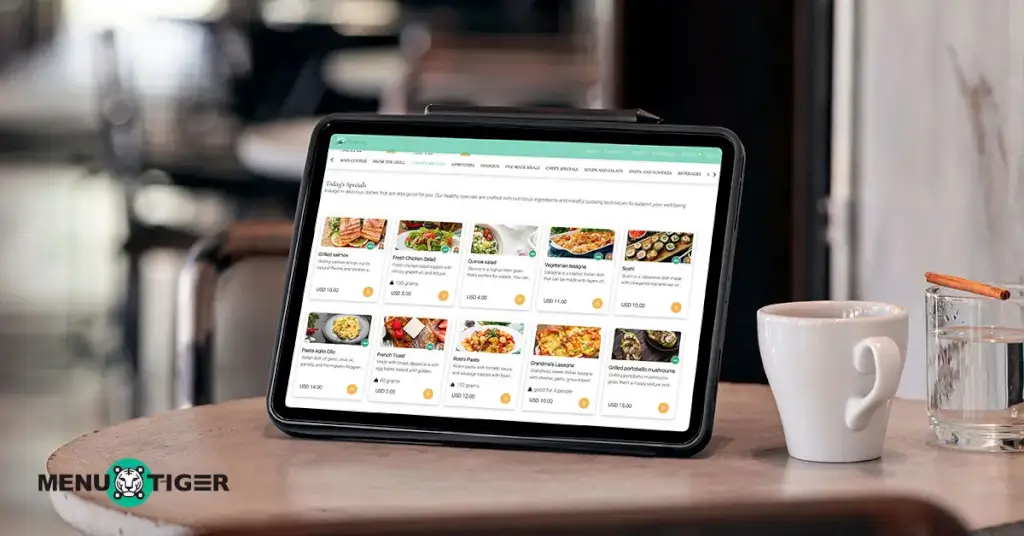
Tablet Menu: 5 Reasons Why You Should Do The Switch
Last Updated: January 23, 2026
Digital menus, such as a tablet menu positively influenced the purchasing decisions of 91% of customers, resulting in a 38% increase in sales.
This data from AI Screen, a digital signage software, strengthens the need for a digital version of menus at restaurants.
It eliminates the endless waiting of the customers for the servers to get their orders, increasing service efficiency and guaranteeing satisfaction.
Also, diners will have a better experience since they can personalize their orders with the menu's readily available menu item modifiers.
All the food details that customers might need — like food allergen content, preparation time, food images and descriptions, and prices — are reflected on the digital QR code menu to help them make informed decisions on their orders.
Learn more about tablet menu design, benefits, and steps on how to create one in this article.
What is a tablet menu, and how does it work?
A tablet menu, as its name implies, uses a tablet or iPad to display a digital copy of the menu. Restaurants often use it to replace paper-printed menus.
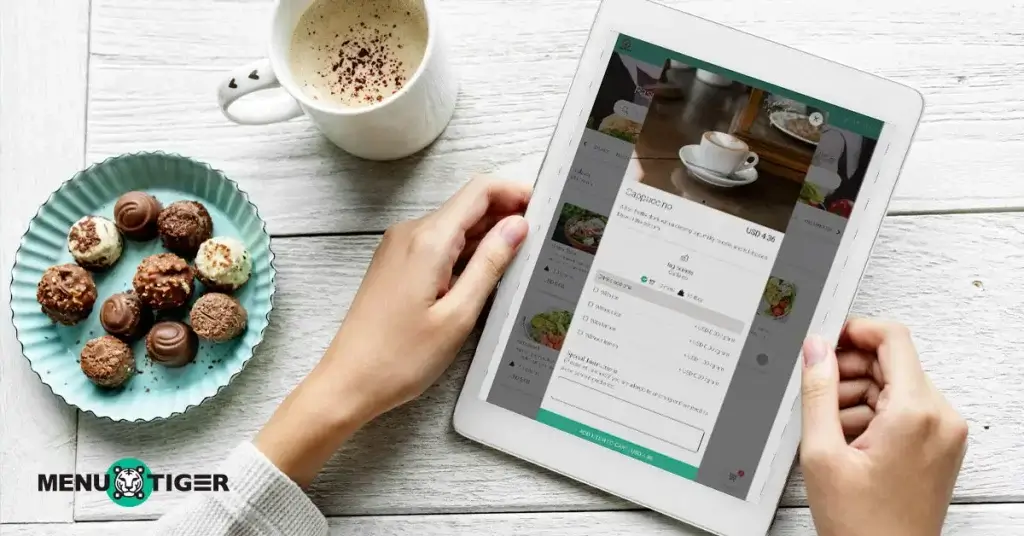
Using tablet menus for restaurants,operators can manage their menus better since they can easily update prices, display high-quality food images, and provide details of each dish.
Two types of digital menu for tablet-access
View-only menu
A view-only digital menu is a restaurant menu that customers can view on smartphones or tablets. However, it does not allow customers to interact with it or place orders on the device.
This type of menu lets you provide menu item information only; customers must still call the waitstaff to order and pay for their meals.
Interactive digital menu
A QR code menu software allows customers to order, pay, and give tips directly from the menu.
This menu type usually comes with additional features, such as the ability to customize orders, view nutritional information, make special requests, and give tips—giving customers a complete and informed ordering experience right from the tablet.
5 benefits of a tablet-based restaurant menu
Restaurants are now sharing menu tablet key takeaways based on real results, highlighting benefits like quick and easy updates and an automated ordering system, to name a few.
Check out the top five reasons why many restaurants have now switched to this technology:
1. Maximizes staff productivity and improves customer service
Stressed servers are more likely to quit their job. A ComPsych survey reveals that a heavy, overwhelming workload is the primary cause of stress at work.
Restaurant ordering on a tablet can lessen staff’s workload, thus, reducing the employee turnover rate. Staff won't have to bring customers a menu, take orders, and process payments manually.
This tablet menu for restaurants streamlines customers' transactions when they dine.
This can add to a tremendous increase in productivity where waitstaff can serve customers better without being overworked and stressed out.
2. Faster ordering and payments
A study shows that service delays heavily influence customers' feelings of anger. And this influences their perception of your brand, which may lead to them excluding you from their dining options.
But with a digital tablet menu, customers won't have to wait endlessly for your servers to take their orders and process their payments.
The digital menu’s self-ordering and an online payment option can significantly increase the table turnover rate.
This is more convenient during busy times when there's a flood of customers.
3. Get customer data using a restaurant digital menu
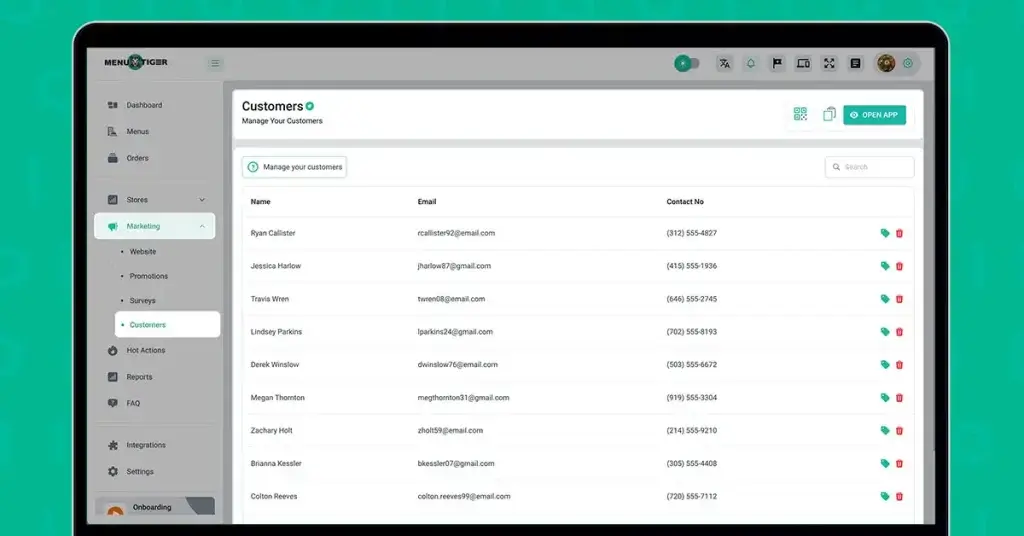
Knowing relevant customer information is the key to designing a profitable menu and formulating an effective marketing strategy.
You can get the pulse of customer satisfaction using the survey form of a digital menu app like MENU TIGER. There are different types of survey forms you can use.
After the guest finishes their meal, you can ask them to rate the food, the service, and the ambiance. You can use the information as a guide to improving areas that concern most customers.
In addition to gathering customer feedback, you can also obtain other customer data such as their email name, address, contact number, and even order history.
4. Better marketing ROI
One of the essential features of a restaurant's electronic menu is that you can highlight high-profit items and label the new ones and bestsellers, which makes it easier to advertise specific items.
Displaying promotional banners on your ordering page can also help convince diners to buy the featured dish. A study by Nielsen found that sales of items advertised on digital signage increased by 33%.
With the Canva integration for restaurant menu, you can customize your promotional banner with its readily available template designs.
And since it’s digital, you can change or update it anytime. You also get to save money previously spent on reprinting menus and banners.
5. Increase sales through upselling and cross-selling
Upselling and cross-selling are marketing strategies that are proven to boost your sales and revenue. Many sales professionals say that it increases their income by up to 30 percent.
The good news is that you won't have to train staff on properly executing these tasks since automation is enabled using a restaurant digital tablet menu.
You can upsell by adding modifier groups and add-ons to certain items to encourage customers to upgrade the food items they will order.
On the other hand, you can cross-sell by suggesting items that are profitable and go with what a customer is already buying.
Correctly implementing these marketing techniques can tremendously increase your sales and revenues.

How to design a digital QR code menu for tablets
First impressions are everything. As a restaurateur, you must make your menu as enticing as possible to encourage more purchases.
Remember, the menu is your primary advertising tool to attract new customers and encourage current customers to return.
Explore the following tips to make your menu presentable and attractive:
Showcase HD and professional-looking pictures of the chef specials
Most customers will look at the images on the digital QR code menu before reading the description.
You eat with your eyes first. If the food looks delicious in the picture, then one bite must taste like heaven. This is why images can help convince diners to order a dish.
Using a menu tablet, the photos must be striking and stimulate a feeling of hunger. Check the quality before uploading them. Always create a good first impression with your food and drink images.
Ignite your senses with your menu description
You can make customers hungry by knowing how to write a food and drink menu description that appeals to their sense of taste and smell.
Tickle the customer's imagination using sensory words such as crunchy, spicy, creamy, sweet, and tangy. But remember not to go overboard. Keep it minimal.
Also, take note of your choice of words; they should be simple and understandable because customers will most likely only order the item if they understand it.
Choose the right color palette for your QR code menu
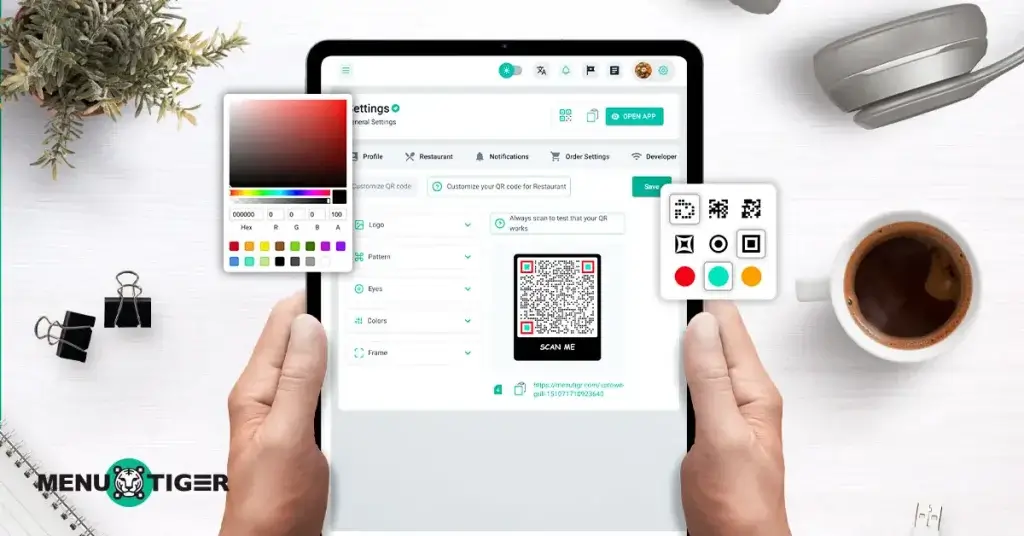
The colors you set on the menu impact customers' feelings; they can make them happy, stimulate their appetites, and influence their impression of your brand.
For example, warm colors like red and yellow are good choices for a restaurant tablet menu because they can increase appetite and are a good choice for grabbing people's attention.
You could also play with different colors, but make sure they complement one another.
Typography matters
Your choice of menu font styles says a lot about your brand.
The quality of the typeface to look for should be attractive and legible—you don't want customers struggling to understand the text. Other factors that can impact the readability of the typeface include font size and using bolding or italics.
You may use different font styles for the food item's name and menu description to differentiate them, but make sure they look appealing to the eyes.
Therefore, you must consider this matter carefully as you get on with the art of menu design for your tablet-based restaurant menus.
A step-by-step guide on creating an interactive digital menu for tablets
MENU TIGER is an advanced and intuitive digital menu provider with complete features to assist your marketing efforts and streamline operations. Using this digital tool can also elevate the customer experience digitally.
To create restaurant menu on your tablet using MENU TIGER, follow these steps:
1. Go to MENU TIGER and create an account.
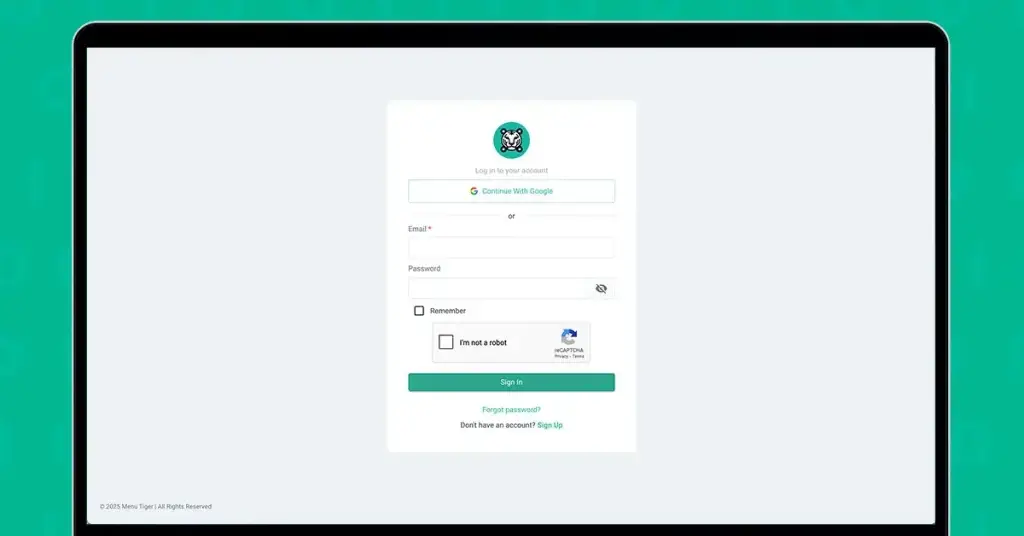
2. Proceed to the Stores section. Start by filling out the required information to create your store.
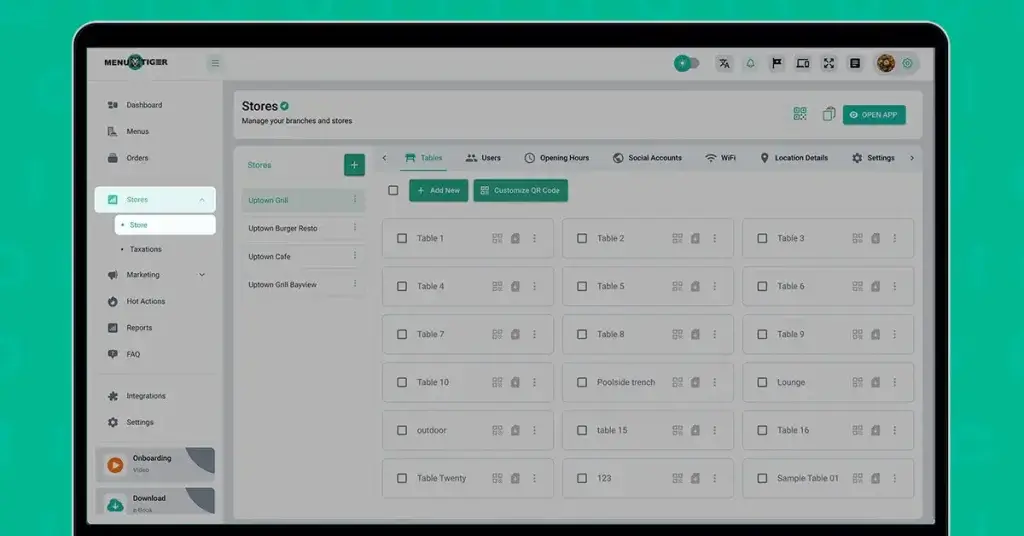
Note: The number of stores you can manage varies on every plan.
3. Set the number of tables that need a menu QR code.
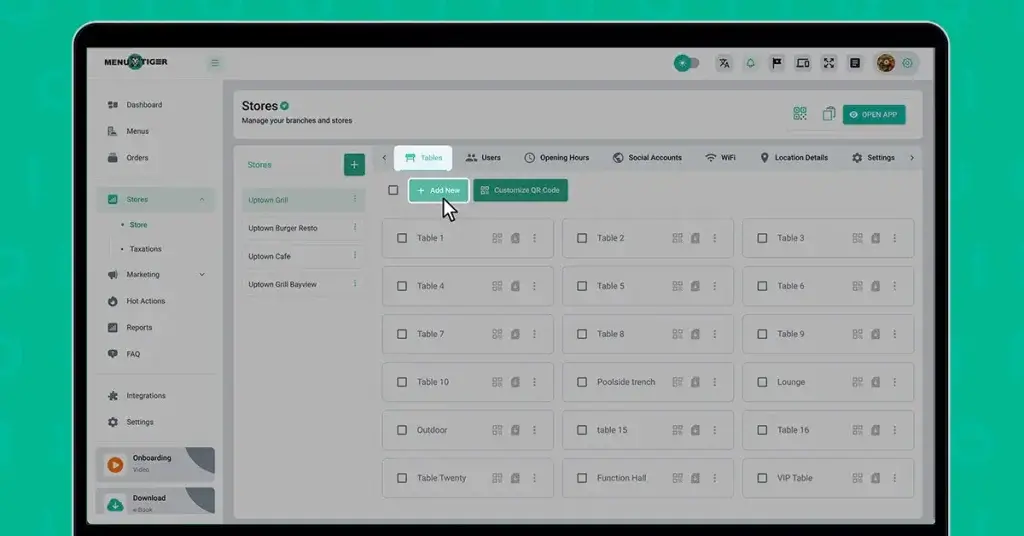
Note: You can customize each QR code for each table.
4. Click Users to assign additional members as Admin or User.
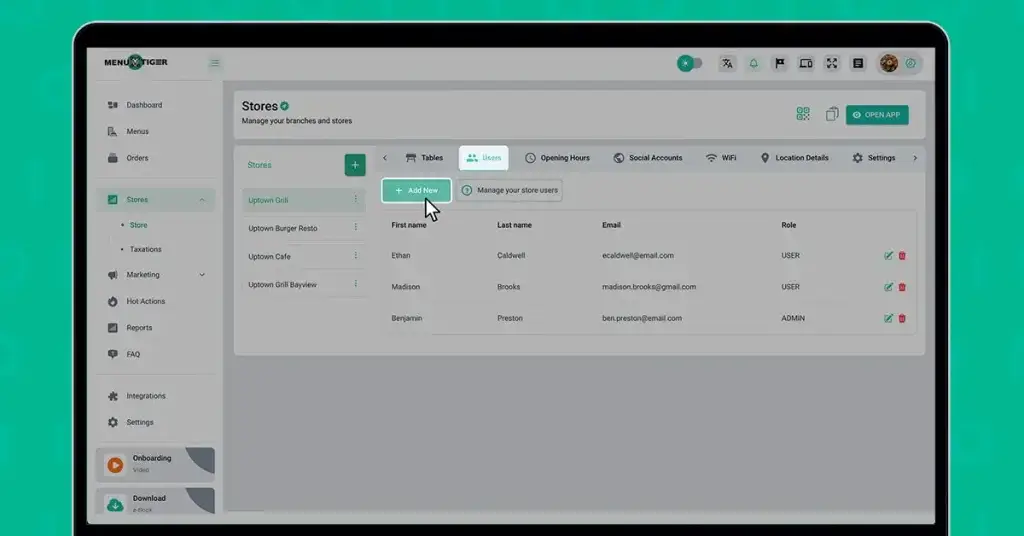
5. Go to Settings and enable takeaway and dine-in ordering options.
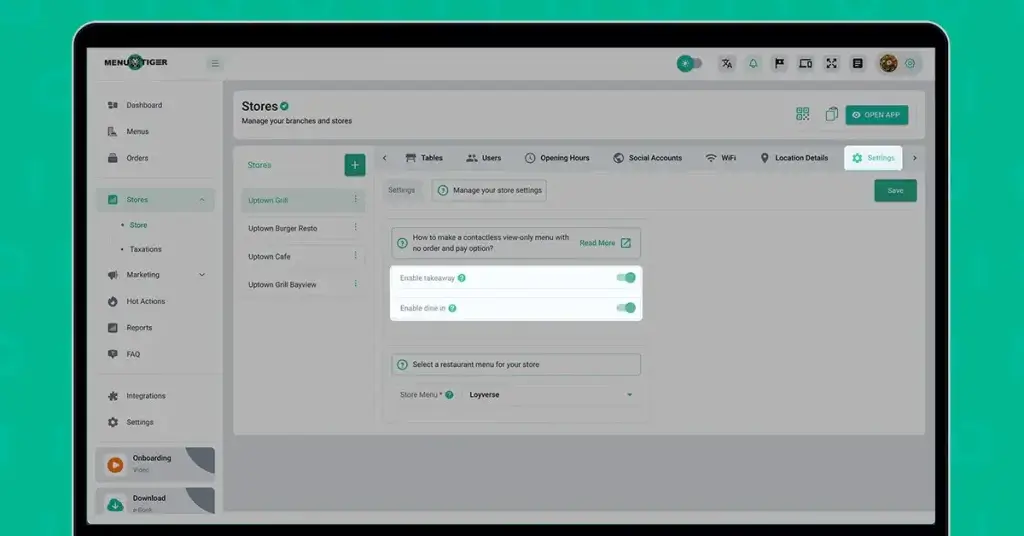
6. Set up the menu category and food list.
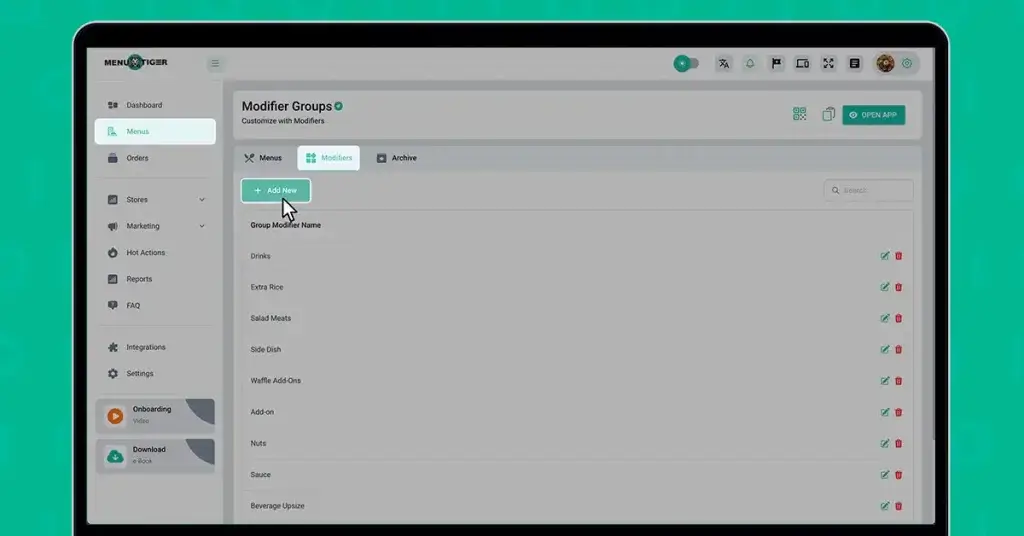
Note: You can add unlimited categories and food items.
7. Under Menu, click the Modifier subsection. Create modifier groups for add-ons and sides.

8. Click the Restaurant Website section. Fill in the necessary information and customize your restaurant website by choosing fonts, colors, and a color scheme.
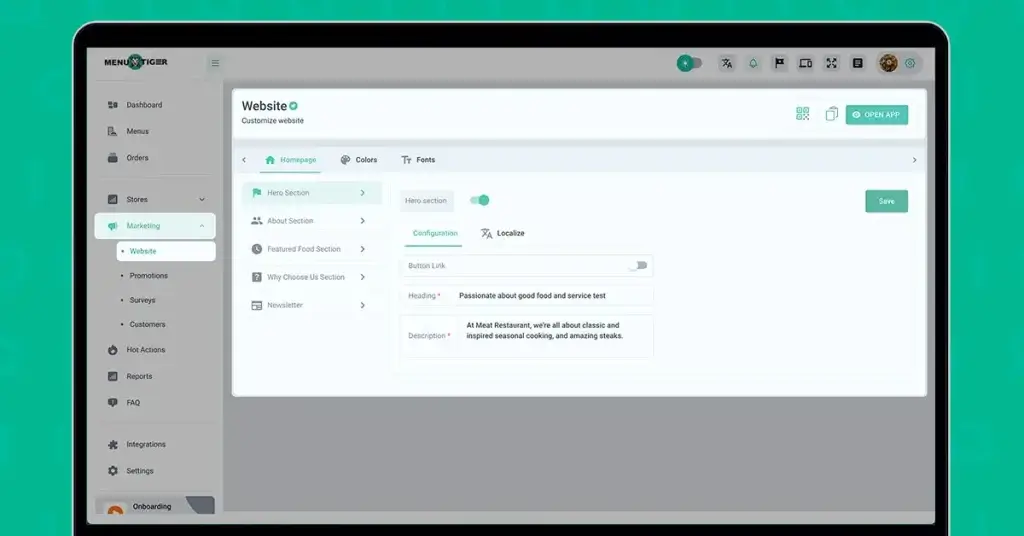
9. Lastly, proceed to Add-ons and under Payment integrations, hit the Enable button for the Stripe and PayPal payment options.
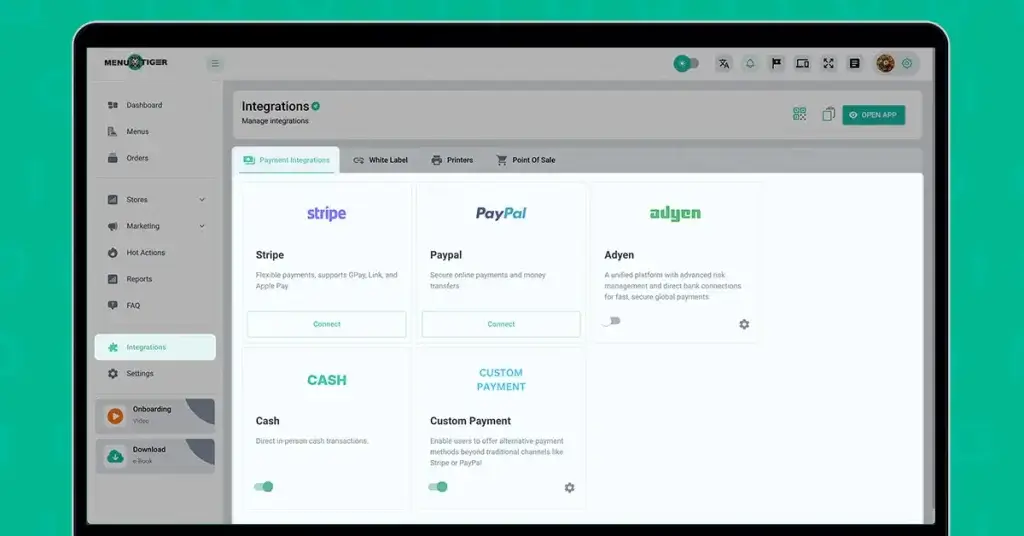

Create a digital menu tablet with MENU TIGER today
Adding a tablet menu will positively impact each aspect of your business- from elevating the customer dining experience to optimizing daily operations— making this an excellent addition to your business.
A menu tablet key takeaway is that can streamline service and improve efficiency.
To make this happen, you need to invest in digital tools like QR code menu software to keep your business ahead of the game. Choose the most reliable and functional tool to experience relevant changes in your business.
Go to MENU TIGER and start your free demo. No credit card is needed.
Junah Cen
Junah Cen is the type of Content Writer who uses her teaching profession to weave digestible and accurate content filled with SEO-friendly magic for the SaaS and Hospitality Industries. Off-duty, Junah's zeal for church activities, connecting with youth, and voracious reading define her vibrant world.


